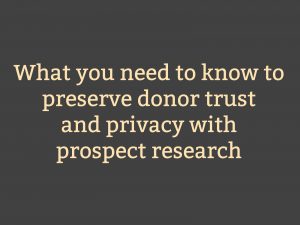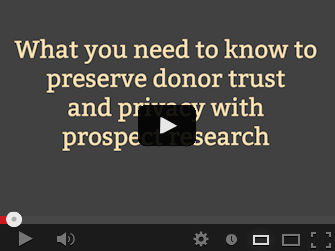 On March 27, 2012, The New York Times ran two articles on its front page: “U.S. Agency Seeks Tougher Consumer Privacy Rules” and “Private Schools Mine Parents’ Data, and Wallets”. I was standing in line at Starbucks when it caught my eye. There have been a number of similar privacy-gone-awry stories in the Wall Street Journal and other newspapers across the country and it seems to be intensifying.
On March 27, 2012, The New York Times ran two articles on its front page: “U.S. Agency Seeks Tougher Consumer Privacy Rules” and “Private Schools Mine Parents’ Data, and Wallets”. I was standing in line at Starbucks when it caught my eye. There have been a number of similar privacy-gone-awry stories in the Wall Street Journal and other newspapers across the country and it seems to be intensifying.
As a professional fundraiser, prospect researcher and donor, this news tactic hits a raw nerve. Yes, data and privacy issues should be reaching a crescendo as the online activities of great masses of people are creating a less-than-regulated world of data collection and sale across the U.S. and around the globe. But why pick on not-for-profit organizations especially?
Donor trust is the backbone of not-for-profit organizations. Without community support an organization is derailed and its mission discounted. This means that when an organization abuses donor or public trust, it is a very juicy news story indeed. But what kind of data transactions are really going on behind closed doors and what can donors do to ensure their favorite organizations are behaving appropriately?
Online activity in social media, shopping, gaming, reading and so many other activities has reached a critical scale. The numbers of participants are so big that meaningful information can be extracted from our behavior as it is tracked online and offline. For-profit companies are beginning to make exceptional use of this opportunity, as one might imagine. In 2011, The Economist magazine suggested how Europe’s Tesco appears to be using its retail sales information from loyalty cards to inform its recent auto insurance underwriting.
But not-for-profit organizations are not selling you a widget and are not involved in helping you get insurance. Not-for-profit organizations are attempting to achieve a mission of value to fulfill needs in your local or global community. They are data-mining to more efficiently raise money and that should translate into lower costs and higher dollars in gifts. Overwhelming, donors tell organizations that they want less money spent on “costs”; they want organizations to be efficient, just like the for-profit world.
What do we like about our favorite for-profits? They deliver good product, they treat us well (if not great), and we trust them. Same goes for not-for-profits. Except that trust takes on a much deeper meaning. Not-for-profits help those most vulnerable in the world and therefore they must be beyond reproach. Added to that is that I am GIVING them my hard-earned dollars!
Most data-mining efforts in the not-for-profit world attempt to prioritize donors and prospects so that those “most likely to be interested” and those “most able to make a gift” are approached for all of the different activities of the organization. This ranges from mail appeals, event invitations, online and offline content development, and, yes, major gift prospect initiatives.
Data-mining fails the donor (and the organization) in two primary situations:
- When the information is wrong – common names and other circumstances foil the best systems and the most skilled researchers
- When the fundraising program is not operating effectively
The donor needs to pay the most attention to item #2. As a donor or prospective donor, if you ever feel disrespected, insulted or otherwise uncomfortable you have to ask yourself: Is this the way in which the entire organization operates? The two premier associations for fundraisers and prospect researchers provide guidelines for the ethical treatment of donors and all the information wrapped around them. You can check them out here: AFP and APRA.
If you trust the board of directors, adore the program staff and witness the terrific results of the organization, why would you be worried about their data-mining practices? Most likely it would never cross your mind — until you pick up The New York Times or the Wall Street Journal. And a professional fundraising office, like the one at your favorite not-for-profit, would be more than happy to discuss its data-mining, data collection and data privacy practices with you.
I would rather the news focus on for-profit companies and their secretive and very profitable data-mining practices, but if they are going to pick on not-for-profits — well, let’s use this as an opportunity to have some great discussions with our favorite not-for-profits and our favorite donors. Transparency in the not-for-profit world is the best weapon to secure and defend donor trust!
If you have a story about how you have used privacy concerns to have a reassuring conversation with your not-for-profit or your donor, please share! Those are the kinds of stories I wish the newspapers would include in their articles – even if they only drop them in at the end. We want fair representation!
Sources:
- Ethical Code, Guidelines and Standards and Donor Bill of Rights, Association of Fundraising Professionals (AFP): http://www.afpnet.org/Ethics/?navItemNumber=503
- Statement of Ethics and Professional Standards, Association of Professional Researchers for Advancement (APRA): http://www.aprahome.org/p/cm/ld/fid=109
- U.S. Agency Seeks Tougher Consumer Privacy Rules, The New York Times: http://www.nytimes.com/2012/03/27/business/ftc-seeks-privacy-legislation.html
- Private Schools Mine Parents’ Data, and Wallets, The New York Times: http://www.nytimes.com/2012/03/27/nyregion/private-schools-mine-parents-data-and-wallets.html
- Finally! A journalist GETS prospect research, The Helen Brown Group: http://www.helenbrowngroup.com/2011/12/finally-a-journalist-gets-prospect-research/
- Smart Money: Is Your Favorite Charity Spying on You?, The Wall Street Journal: http://online.wsj.com/article/SB127396687577792419.html
- As it pushes into finance, Tesco’s Clubcard gives it a competitive edge, The Economist: http://www.economist.com/node/21536605
- Taking Fund-Raising To a New Level, The New York Times: http://www.nytimes.com/2011/12/17/your-money/fund-raising-taken-to-a-new-level-your-money.html
For a fun 7-minute video on Privacy and Prospect research, click the movie below:

 Whether it’s a personal story or a media headline, we’ve all heard of incidents where data was mishandled or misunderstood and donors felt betrayed. And yet, many development and advancement offices continue to place little value on their information and data.
Whether it’s a personal story or a media headline, we’ve all heard of incidents where data was mishandled or misunderstood and donors felt betrayed. And yet, many development and advancement offices continue to place little value on their information and data.

